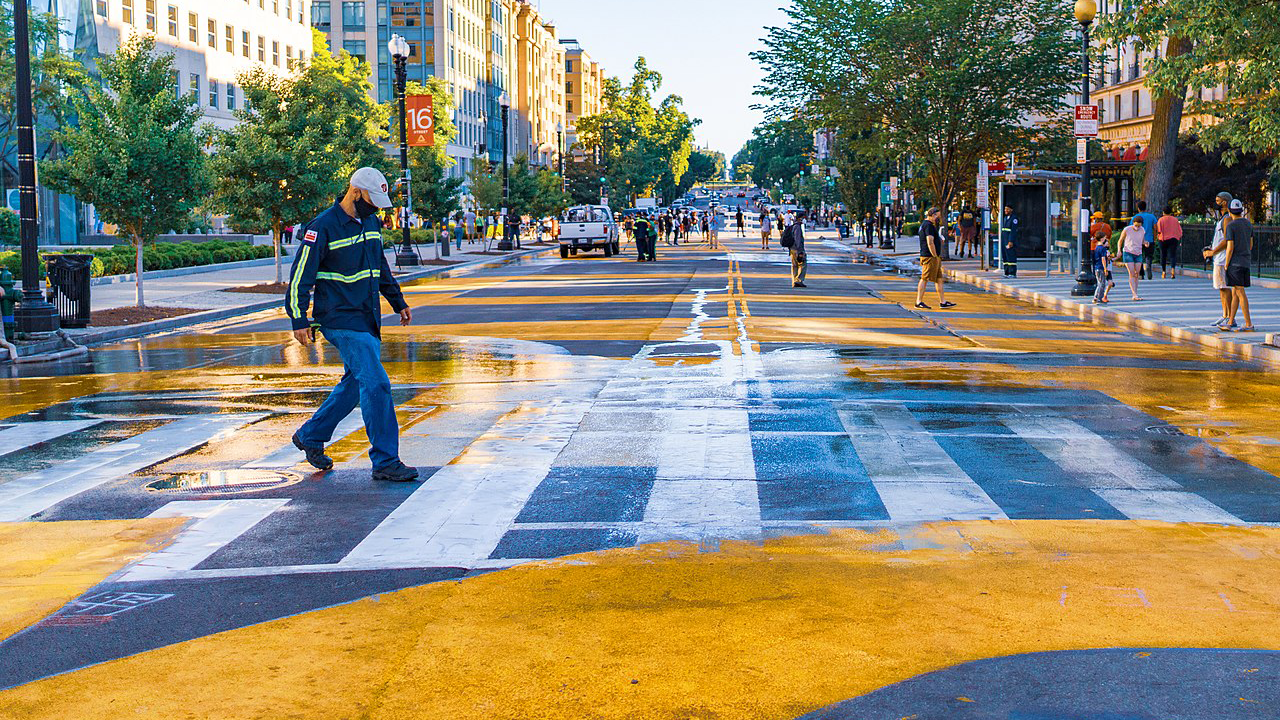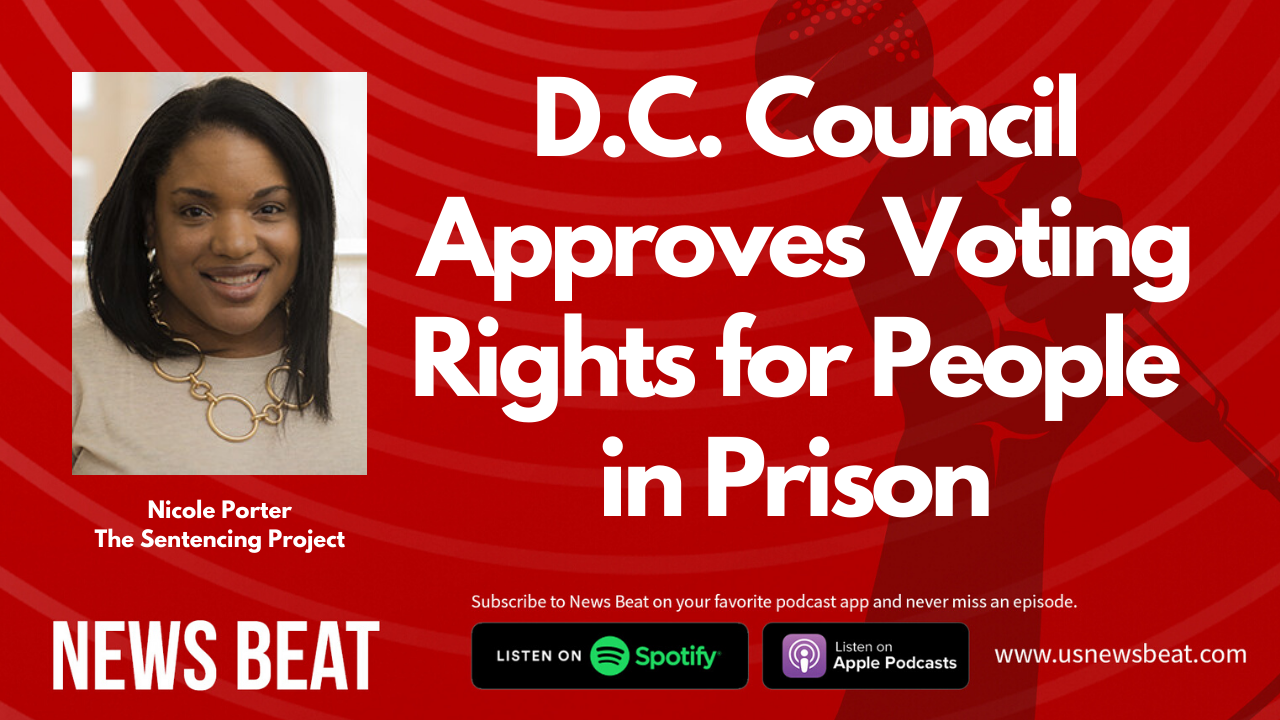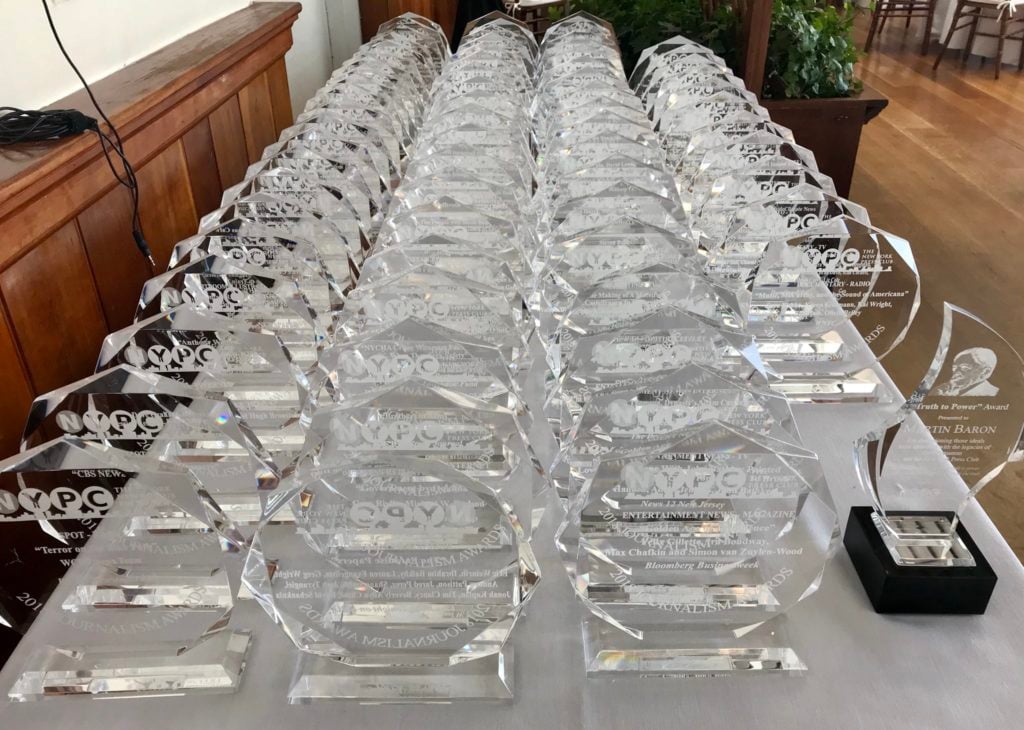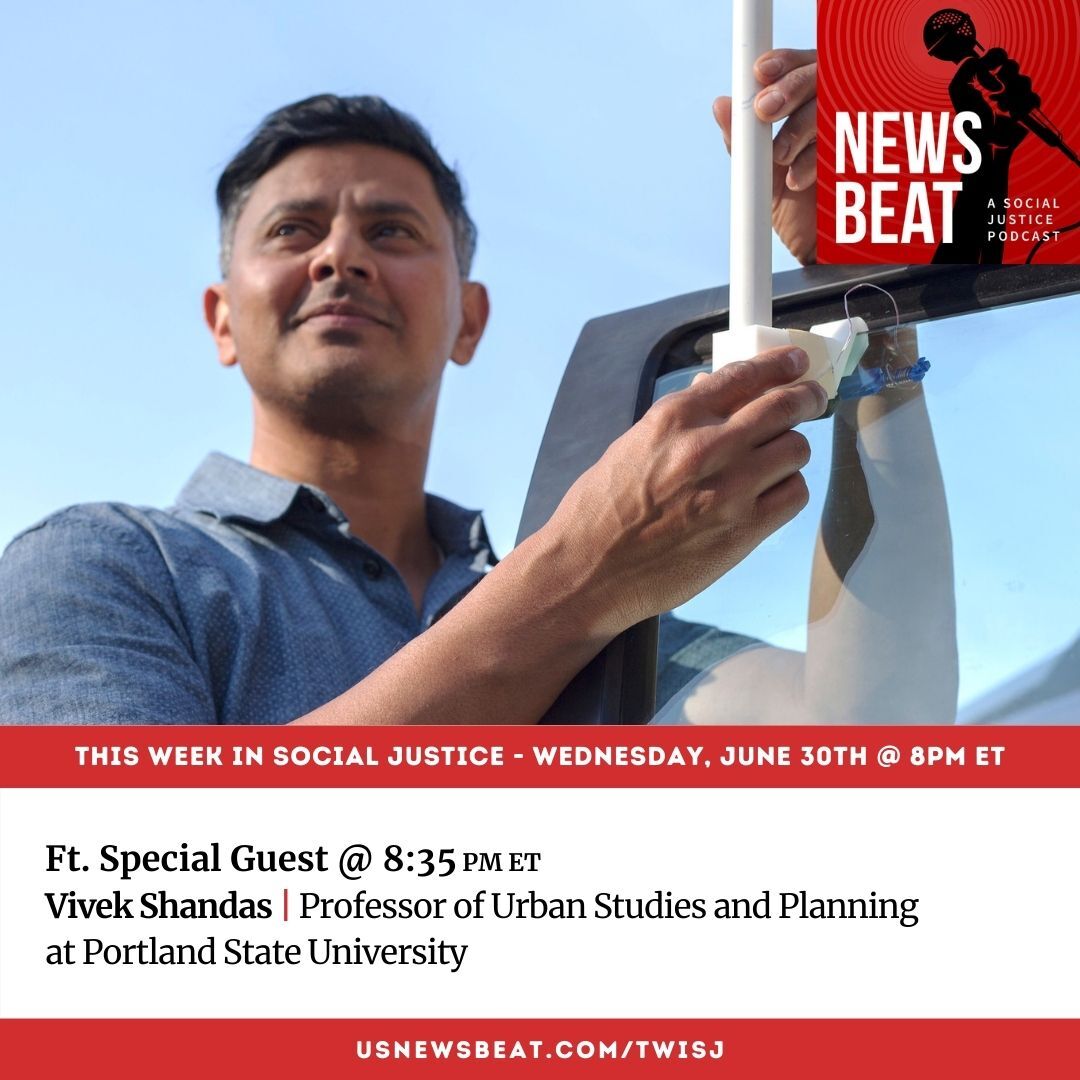
(Black Lives Matter Plaza in Washington, D.C. Photo credit: Ted Eytan)
The Washington, D.C. Council this month made history by approving a measure restoring voting rights to imprisoned residents serving time for felony convictions.
D.C. now joins two states—Maine and Vermont—that allow people convicted of felonies to vote while serving their time. Incarcerated felons haven't been able to vote in the District since 1955.
Introduced last year, the provision was included in an emergency reform package adopted by the council this week in reaction to mass protests over the police killing of George Floyd and other Black Americans. The Washington Post reported that Mayor Muriel E. Bowser is not expected to veto the measure, adding that as an emergency provision, the law will only be in effect for 90 days, meaning the city must approve a permanent version at a later date.
Under so-called felony disenfranchisement laws, most states outlaw people with such violations from voting. Until the measure was passed, D.C. was one of 18 jurisdictions that didn't restore voting rights until someone left prison.
Other states go even further, restricting the vote to those under state supervision, such as parole or probation, or those who've been freed from prison.
"Felony disenfranchisement overall is an example of the very harsh penalties that govern United States criminal justice policy, and challenging it is an opportunity to expose how punitive the United States is and how extreme the United States is."
- Nicole Porter, The Sentencing Project
In the 2016 presidential election, more than 6 million people were outlawed from casting a ballot due to varying felony disenfranchisement laws, a vestige of Jim Crow.
In 2018, Florida voters overwhelmingly approved an amendment striking down the state’s felony voting law—among the most restrictive in the nation at the time—effectively restoring voting rights to more than 1 million people.
The state has since tried to circumvent the amendment, though a federal court recently ruled that forcing residents to pay court fees before casting a ballot was unconstitutional.
To learn more about felony disenfranchisement, listen to our episode "The Real Voter Fraud: Felony Disenfranchisement's Civil Death Sentence."
Felony disenfranchisement has become part of the larger discussion over criminal justice reform in the United States, which has the highest incarceration rate in the world.

To better understand how this vote came to be and its significance, we speak with Nicole Porter, director of advocacy at The Sentencing Project, a national research and advocacy organization based in Washington, D.C. Listen to our interview and read the following transcript, which has been edited for clarity.
News Beat: Nicole, this in many ways is a historic vote, considering the near-nationwide ban on casting ballots in prison. Can you tell us how this measure came to be and why it’s important?
Nicole Porter: "It was introduced over a year ago in June 2019. It was sponsored by Councilmember Robert White but endorsed unanimously by all of the members of the D.C. Council, and when the emergency legislation was introduced a few weeks ago as a political response in D.C. to police brutality, following the George Floyd protest in Minneapolis, and then local protests in D.C. and around the country, the Restore the Vote amendment was included in the emergency measure. But the council had been having a conversation about expanding the franchise to imprisoned D.C. residents with felony convictions for well over a year."
NB: Felony disenfranchisement is a hugely important issue that doesn’t get the attention it deserves. Can you briefly explain to listeners the racist roots of such laws?
NP: "Absolutely. Felony disenfranchisement in the United States has a long history. It actually goes back to colonial times. American colonialists brought the practice over with them from the United Kingdom, or Britain at the time, but the practice became racialized following the Civil War, when southern states in particular reconstituted themselves and used felony as a proxy for blackness to specifically exclude or limit the Black electorate in southern states, particularly Virginia, Alabama, Mississippi. There is a long documented history in those states where state legislators at the time used felony as a proxy for blackness to restrict the voting rights for Black residents."
NB: Back to D.C. Issuing ballots to people with felony convictions seems complicated because D.C. residents either spend their time in the local jail or federal prisons, unlike people in most states. Do you have concerns about the logistics of this? And do we know when people held in custody will begin receiving absentee ballots?
NP: "Well, it is complicated in D.C. because the district does not have a local prison. Even persons sentenced to felonies for District code violations are imprisoned in the Federal Bureau of Prisons. They're supposed to be held within 500 miles of D.C., that's a rule that's not enforceable, but it's supposed to govern how District residents are imprisoned in the Federal Bureau of Prisons. Yet there are some District residents who are incarcerated as far away as California, South Dakota, in Texas. So it is problematic and authorizing an absentee voter policy for District residents will be implemented in a complicated way. That said, the law is the law. These folks now have their right to vote. It'll be challenging to make sure that they get their ballots within a timely matter. As many people who work with the Federal Bureau of Prisons know there's no assurances with implementation, but ensuring voter access, particularly for imprisoned residents from the District will be critical going into the November election.
"I'll just share that there is a practice for this: There are two states that never restrict voting rights for residents, those states include Maine and Vermont. And there are people sentenced to federal prison terms from Maine and Vermont and those people maintain their voting rights even while they're incarcerated in federal prison. So in Maine residents who are in federal prison right now can request voting absentee ballots going into the November election. And the same will be true for District residents. So there's a practice for this, we'll have to make sure that the implementation is done well. We'll have to make sure that the more than 4,500 district residents who are imprisoned in the Federal Bureau of Prisons have access to all of the information and are registered and get their absentee ballots on time. But just because it's new territory, doesn't mean it's not something we should work on together as community groups and as advocates interested in voting rights, in challenging felony disenfranchisement, and now is the time more than ever to make sure that good practices are put in place."
NB: I think we’d be remiss not to mention that this passed in the backdrop of a broader criminal justice reform movement. Can you talk about why it’s necessary to include felony disenfranchisement in the larger discussion about systemic reforms?
NP: "Well, there are many reasons. One being that excluding people from voting is a proxy is an example of dehumanizing certain residents within the community. And so ensuring that residents, even those in prison, can vote and can participate in the franchise broadens our democracy number one, and then centers their humanity and their ability to participate fully as citizens and as residents, number two. Also, engaging in voting rights helps to raise awareness and helps to politicize an entire category and cohort of individuals, many of whom are incarcerated, many of whom are living in the community and may have at one time been incarcerated. And so felony disenfranchisement overall is an example of the very harsh penalties that govern United States criminal justice policy and challenging it is an opportunity to expose how punitive the United States is and how extreme the United States is. The United States stands alone in excluding the right to vote amongst Western democracies. Most Western democracies allow their imprisoned residents to vote. And the United States likes to call itself a 'Shining City on a Hill.' It certainly is not that given that most states and most jurisdictions exclude voting rights for people who are in prison."
NB: Finally, can you update listeners on the latest developments in Florida, where the government tried to tie voting to the payment of often exorbitant court fees? And are there efforts in other states to make voting easier?
NP: "Sure. Well, there was a recent favorable ruling out of Florida that said that the state could not impose fees and fines on low-income residents as a way to get their voting rights back, that it was, in effect a poll tax, which is unconstitutional and is a vestige of Jim Crow, unacceptable, inhumane and an example of racist, unfair treatment for residents given the disproportionate impact of felony disenfranchisement on Florida residents of color, particularly Black residents. So that was wonderful. That case will probably be appealed by the state, and who knows what the next ruling will be, but at this time, and hopefully going into the November election, state lawmakers cannot unfairly and unduly impose poll taxes on Florida residents with felony convictions as a way to get their voting rights back. So that's currently a good ruling and hopefully will help to govern the electorate going into the election.
"There's other activity around expanding the franchise around the country. The District was first and expanding the franchise to people in prison. There are a handful of other states that introduced similar measures over the last year or two including New Jersey, Connecticut, California, Massachusetts, New Mexico, and Hawaii. I hope that lawmakers in those states are enthused by the recent action of the D.C. Council, and we'll continue to move forward those measures that expand the franchise to residents in prison.
"There's other efforts as well, particularly expanding the franchise to people in the community who might still be on supervision, either felony probation or parole. Most states restrict people who are living in the community on probation or parole. So even 'blue states' like New York and California could expand the franchise to people on parole in those jurisdictions. So that's sort of the next area of reform. There are active coalitions in many of these jurisdictions and people can visit The Sentencing Project at SentencingProject.org to learn what their state policy is, and also be connected to state coalitions, but there's a lot of activity there.
"And I'll also add, as we wrap up, that there's going to be a lot of effort to support jail-based voting. So this is different from people voting in prison. Most people who are in jail can vote. Most people in jail are held pre-trial or sentenced to misdemeanors. There's a great deal of activity around expanding jail-based voter efforts.
"And in fact, The Sentencing Project has published some recent work on this and people can find that on our website. But there's active efforts to ensure jail-based voting in counties like Cook County in Chicago, or Harris County in Houston. And going into the election, there will be active efforts around that and if folks in the community want to support jail-based voting, there are ways to do that going into November."









